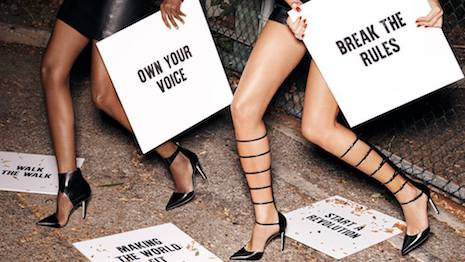While many question whether brands should comment on social or political issues, research shows that for Generation Z, social justice is the way to their hearts.
In an era where social norms seem to be shifting and important social conversations are at a high, a new study by DoSomething.org has found that 76 percent of Gen Z consumers have purchased or are open to buying from a brand based on the issues it supports. Many are now even seeking out brands, rather than finding them by happenstance, based on social causes.
“Young people have long looked to brands for leadership in a variety of areas that are important to them — technology, music, entertainment and fashion,” said Meredith Ferguson, managing director of DoSomething Strategic. “Perhaps it’s no surprise then that they would add social change to that list.
“They’re saying they want government to do their job, but when that’s not happening, they’re making companies — the other big influence in their lives — responsive and responsible,” she said. “Everyday acts like grabbing a fried chicken sandwich from Chick-Fil-A or a pint of Ben & Jerry’s are now political statements and social action.
“Shopping can be a point of pride and the refusal to buy can be a very intentional act of defiance. And young people are the vanguard of this change.”
Social change
Contrary to preconceived notions, Gen Z, defined in the study as those aged 13 to 25, are not staunch liberals. Fifty percent, in fact, think of themselves as moderates and almost half identify as independent.

Chanel fall/winter 2017 features Gen Z's Lily-Rose Depp and millennial Cara Delevingne. Image credit: Chanel
About 50 percent claim to have recently purchased an item based on an issue affiliation in an effort to take a stand.
Another 40 percent say they would cease business with a brand based on how aligned it is with their personal values.
African Americans have proven to purchase based on beliefs more frequently than the industry average. Thirty-three percent of African Americans claim they make buying decisions based solely on a brand’s value system.

Tamara Mellon aligned itself with the Women's March. Image credit: Tamara Mellon
Sixty-seven percent of consumers of color say they do this at least some of the time.
African Americans also seek out brands based on social issues rather than stumbling upon them, using this approach for 33 percent of their shopping.
Social stance
Many luxury marketers have been taking strong stances on social issues to elicit change.
For instance, Italy’s Gucci helped to bring stories of social issues to a broader audience through its Gucci Tribeca Documentary Fund.
Now in its tenth year, the partnership between the label and the Tribeca Film Institute expanded its efforts for the recipients by linking with the Oath Foundation to support the films’ distribution and campaign strategies. Since launching the fund in 2008, Gucci and TFI have helped 83 films through a total $1.3 million in grants (see more).
Recognizing the power they have to make a difference, prominent brands and personalities in the fashion industry are throwing their support behind causes.
According to a report from Fashionbi, both protests and activism are on the rise around the world as the conversations around issues such as climate change, immigration and gender inequality heat up. Within this environment, the fashion industry is taking an active role through charitable partnerships and awareness campaigns (see more).
“There have been numerous studies showing that young people today want to align with brands that share their values,” Ms. Ferguson said. “But what we saw in this study is young people telling brands that they can’t limit their cause engagement to the purchase itself. Only 34 percent of respondents feel that their purchases ‘make an impact when the brand supports a cause I believe in.’
“Nearly half of our respondents say that it is important for a company or brand to have a social change initiative that consumers can be a part of,” she said. “Think about that. Forty-nine percent of young consumers are telling brands they want to be an active partner with them.
“That’s an opportunity for brands to tie themselves with their consumer base in a way that rarely presents itself. And this is especially important because almost half of respondents believe that ‘In the future, I will…change the world in a meaningful way,’ but only a quarter believe that they are part of a ‘larger social movement to solve social problems.’”
{"ct":"p+QViKwICLlRfe7mQUQUuoixNrLBZxgTPqOVVDHUpDeo\/wUNrZERErJ+9HffH+Y89XduOeVRJKpaTOoD5iVdf6a0K6OsvHy5no0h1n+tyrbLRJNKFC1tuAPyYTaVKSJZArPC8b7yhVSSdFrkrgx5nuTL0f51tIf\/eMUTNxr6x99IeOGlg7h1V+gwzN4x9Skcq7\/\/438mS4PDQd3Hdz\/p06kCORIt3kO4ZSfPN1887\/RV0gt+xm939Z8QyVeaZOzcuwu8P66k9Vz3uHCdRg2UMF5I8G4RFKyXR2brgobTUsY1XpQOYKmWtX5K4slej9s7IE6vsexVcG1h3lU30x7vVw6\/b4eZyWu8ThpNthrjc4nenTISZGq+02e7R9fU9bcdlRjKqaXNvldQaXH7N\/b4\/ZVTNQSvsIeaZi9XseRn5oaEKdbcQIP1\/wUDz6wfu1eYPW12ip7ewN1rBOqLZdGCFQwqE+SN5oegvEgzsOzYN7hJJ3D4IvK4hxs3K8IK0yIsDSJ5G6HtAWeg6jaUBtqY8+iyQp9wxE1Luc3uG3jbyY2lAwFXIYLOIRHFRv4hXVMT698BNeHYbG8UJ7W4dFpLzG0xUgcTcQzpGraYLnslBYtvhMfMvfG9aor3Rb3HeyZN0SAh\/E6pw0kTRyzzv\/sfzgG2GVqg1YI\/2GKceED5iQ0W9S07vmGWCGXT0iuBDhhncy\/I+6C2xBaZ1e1MS5+AeLJKa182QKwYTKRN6RQKvix\/JKHbfUuRhspM\/4jMm1oxFAVPLyCQy63Gq4fIYVCAWzYLFZxGRnyf7E3pY0lxLk3VjFtE2xlngoVSIOURSkmvvrrTd0jREKQXUGYJ91ZErdpbUYxrsTIACPmqgEpF0ZnHaI2o8zPhLvrjUuLTPihUENCJl+UBPVhwseznnHt6MYxeVqNPt4jHRJFfGMQG5HjuO1JVHEY7fgDoLF958OvwGrTBe1gILOrq2r66IQrDREx4UcQU9a29gLA71RGZxSZCSzyXfT2HsGdPhP2jJ5WtkGV+a2wTlKevEEplgYwp8J2WHxP8cUK5xaEliJYfLH23pYh\/QZtixdM\/sl2W4NKAK6NB8r5YV1SNNE0G60aJXghI7E6Cln\/BAJbEFnj6kxF4Bg8dU2oHzTqhEfDVGybhy4m0sdRrVi16KoimYbkz5jaBl7hd\/OSZm+NXHvnI\/Sg7NIvajOH2eQypdWCYQYKDJjZdQZJ1ZRZfdc9Le\/gw4vJAkydMbdvlhgDAiUP8Mpv4Q1qg2b7x3htXZKt8k+odCvoBKOK9h3M7g8UiIj5HNrsmDrowQDRO4OMVynNWqFi4T2rmwvDl5Kvvz1R1nnXBY9UFRpD8FqwTtAFuPHQu\/aKVaJ9OxqguJJnTtkJP8FD2Ssfw\/ag7MAfTj8SC+lvcE309M+VadaSvsbjh3cCq4c4tAAJP+nu7oC+7dVt1OzjonUTDfRDgO4nIeSK0T93fK47zpP2PqBgr6iSOFy0Z6+Z9CdfSZGX8O+VzoLjDL4\/x\/A7PKXM6QTbXQiXm47GGAjtU+M1VxPM7wK03t7h+aeF50IJuv8RV5172pHzb46HUT38wlSSeJNm2Mke+gu\/i1BW6HqQruJ4c9WkQgPys5OKl49gQdw\/wljT3G5iLWf1ZJ1zelvAKl4nFak7eZFoTx33+wNFvHAUXFWbLRnVqO\/Q+zxzAoEvwszfV7fm2B+AgiNmykmJtyj1EULoy3\/rqWRCWoNWnRomqDPYIBYeZ6wrAWat9SMXqJSfLMvNaBZ04cBVcyOmljRga\/L1LAS4Ra0zKzIq3OuM4N5CVD8l9ovxjR64DJqDvjfLIuufo9WM6N7j37WGViha262axxOJPuJSOAvscfiLjsZuANKAksyOGVg8WJ9\/m4c4X1JPkoETB+KHJ2jbnamkFq\/xRgZbG+5yZdWzFMPZD0S6HFZxnv68XgvjAsY+2duPzXlWW9Bn8YkFDgBsSA0issGtSQt0GOdrjU9LyJT9qJmoxbQ8tJpYJ+PuEWsPHXIDx2ctTxqQhKf1FX0q8jO\/HnkPHYxJgOb0otWaigUP3rttMaTn+1SDJBuw9Y\/696gxIUGw5gjPTtITguz58SmQm1r4r1hBBaGSfoAO1OdC8kEStiP1YgzIWot8+RFS997kwznWqZl9\/mij0ehg5Us8O9wt\/csNaLvy9nJhNl3aFirwvH+ZId4xB5gzeZUSVq2L29BMgUATsbMmKbfP9+te9y+B3t6xXlBS1hn30xNOAIluSdsNcym+Kgcj5DLfZhrltJgMPFQcyrr4qk0SWeNrGD4AJeU1tB0RT76CzlPxizGO24r2gFIiBDTlFZPEHgh6IutO29uO7rOCGVRKoo2X+GZswz3owa7g5YoDcFBxDX0hSinCgX0ZY9kEUSltNKhF\/OwLgxGcYpzgcD2TKuRu0iZGoR5zgq0zXnY5YJvuywlLW+PMsQwA\/s2t2vTjzXS+4JzImCjOuQLH\/5pRsg4vm4M7H4w68YQK5\/JYhjAQ4BcB8NhNcu1WlLLuTPbEwMDHmnYGqYqhPmjTxTa7eMgvgpE85MMS5LweFyPipS9p4qCpABOKTjI6nLjlk\/peuqJLdw7iu0CYEb6HU4KdyCeEpJOV18h\/Wb5VZwRcOfnDuFO85CWerIfHwa0EittzuQZerlfmAQqmRQo6TowD+7bB34GykS7a4Vl0+x9C2mSUUbu9zpj8g50AoBBYrWskioshoOMbx++YJIrFZeL7yYOlKtN9XflX7NbGQfQ1YBZ6maqHeUdnYTlaAiE1hpg6eSV4P8Hf45Nd94sKK8cAKnqoZg4LAehaMuo8\/r3zvr19yJ\/L0epothYNLhn9Mch\/V37hF2s42GH0dm3u0AZXyXOKcHk4\/LEnSnT6bLAXTfBryfu6inu3otgktO6yup53pw5rv55NJldWXSjLeFfqvKfYVUAerdbyjOLnlclsxEnvcqY9nDkHFKvPSuS8mWTVq1TTpletYWxprH+eu72koIvueBBSgsrL6wU0HL9gJwV03B6ktc624AkkPKYBLlsT\/TbxJqLIed71yDbsnsbasnbci4f3+rD8q51jh6Gc\/IhQHvJOJ7aRxeWOPumyFE7ta3tqARrFAioM9fxfb6qUZ\/1NrOi4yQYtVyOi4RL52eIHvyUXbr1KOlYeJnWdqj\/8AkvODiNSLBaG8qD3nxr+Fda4xzeqltxsnvDzRxbA2JdNk2GcA2kZ12aSjHeuhKZsMK0c3MdD0r55UtqMXyvEyXsOo57iz5oJSLcUROpPxSUibp1LGZFHVZKhKlqlToApDGcEE0kw9tHcTzQ9eq\/fdmPN5IPJK9QK6eExE+GSVXBjvbFXToK8BIddUUEh2HrlFSl9R9qY0\/k02qArD35QnqYGFdKYIODLfSNXRbas2k4p0Pl4MMG3P\/iAIENillZbycpQY8\/FahJMk9eXd+qw67b7nPPp8vfUl\/oj35jjuO1Z5uWyIrReRXVpncp8r5XG4ku4\/OXKgFdvWlOYqZGf6TL4nf\/HmzZQTeY5cf386FuzdjF\/InhAM5qYu9q0jm7YpQhYo9Aqoxt6i8VK2WWlE9G95yFrfRPSXMug1pdu5CeJQO5f65mgDaX32ZWb+tAamlFvc0W2cIFxMdHm\/5EiZcbFAZdDYWZa9tlAG3q6VWmyIXkKt92nTjxKVcKEWbF5Zuwy6aGEgOdm5afuoVO9aMOQaZgZkCYg9WL7Jg4aYNCqqpQZCr5k3Vxo2UGLQ6D+V2FXV\/hWbI\/ICbOKJyMIVexiKu+gZup9T0Sq3PNqoo55hVK8JHaR+4\/Gf1DuE94qxQi5sOlDtgNWKAJ4AAFWXOGF88al7ehSE42ranL0hmamMVSoutJLvCX1iJYBjxMadDBYmkopUz823AfGjxtuFiN4xW3+kztV\/BEj98Ro7KlSUXbQ6L1C4OO3c1kHKZ0MVydjqdDTC60cjRVY62S5ca48XIYwDFmoaFSS\/lBHGE8p9Ew0b8YzhHgl+qOyvqUmCYvGAe7goBDokHQnb65S\/W72jrVEn9iK4qoIoKQiSK2+K9Xdfq3Vi9z6Z50rPO1gv3bAOM\/9\/aXE16rzto4igYbuGMDgJnNn6dBkFwTgXzsp3aPgo5EXaIIErxYw6i2qQbZYQzL9m+Cy1VTy+Q9QYAQ7LGayRkMs1Vb1KBPBgOGHzNzxRMc5Too3MdtutgQGj5eZWw+hngRlFsnyHDg1xU0zf309fDza\/I45e3RMQUhpCyzpbk6XTacZdXrz9pqNrigzXovMJAd47QenyeMokhn48Dwkd\/tVCXbb5\/iqzQChU9o2qEMJiURxjbAx7ApDt6Rjg+2ZP7sVI7xpdBxM6fFXlxWx\/tsRx\/xWMOCUQrr+5f6K8Dn0B82lEVeVzXZ7vxxivTwzPJfxIAFiyfAMIGzV8\/UP2vm\/SbJHWv8v27JQJndy3gxJUoSEAXAhth+DK2WtP5ydiS2kesJoHXD1qm+N0Mzk1pb+ijFxFg2H6BO8++OHLVypl+VoyXY+529nidWOF5o\/GuGkSB3+LSBtYhpg4xDsWcFtVnPm6gUbfAVrg0COAW37Lyx26mI1QVa+2cn7fDa0pRUUR+owxjGLWH9hY4N5Q2a3AdID5EVpYEUEMnu4gIOUKI\/9HJlG6N42KKY3sSRP7mPker93byU1hG9ocAzqZZN5fRyzZZDlwNxylwKXRekqdmbrAKKI7BQfy9c9b1HxgMjBr6JN3Q1kAjzyMksIOKgzM6DJnZLc4LffrrCRWRJkgyd2nQmv+qFerD0N9RdUSdiAJ5s++ioMNMLgrUwyHgCfl7Hj8\/0ZfSot3SgFWzrC\/D0Sw1QWDjoUZNR9phka8Aw0Ps0B8sRIT+8nUu5Kmol7pDKVwYINrss\/6NJ3t\/uDM6Gy6bqVW7E1SsCz1KVcvQlfxKcT9SPyNeFQ7Dv6uVmZFvcgfYDoB8wyW3jnbyhKCLe89gXOkBmw5T\/TZ5cUxSpZpgLMFbgfjhhmuTu0a\/Y2ZrxyvxTf0Y+g2RHYmkBNxjxm2DLjbZg02tKi510I45u8vUJnYOckfocbZlmPpg3eGzliHNkXikdwurqjB6ZYQ210huhjtXvBYVn5PfJIASDCqvEfAXBZvlo61xGyppoOuylAPYr2YmBoyO8itImQpRiH0aNwJOmxoncafCV1uFAdrZ2Un60sGpl0u+U4qMYssRKpwHX\/cMtA1dR3VXZp9xppWOGb0kKYnZNF3DCJiTbUOPwYrRbBu7U\/vrLdODWAs1E67iXW3ImaWsv00NoIqe9fpVv8jOC6O+LCTmI6U+xt0MT5oODDFB\/5UZBlZ3boAFkAkgimFdx3vvRXtnHREBKGe3aFnWGolXA+NZArp5aU3CnY2pU862BKU9M240ozXdoujy0wLjMfnZrl7cWoWHlZMSWWCKhFHF\/RcKbKOgcEuilnJijfJgtQ79S+mQMwucqLnuo\/Zoal\/KzakTAr9us+XvERBMYSNYht\/LA53MriA6ZMqQtHn8R8qhXYz0ppT4qEj1Ag+x5lKYFTtFKkh\/RG7geS04bK8pz9JWEzpMfoAbTueWqN\/TVOBdVIjBlijaXUNy9qpFB697YucG0ZEDGzu3olBZTG\/51NvJ9AY\/1kOU8t9wlmcx+JwBLAMjaxLXQnJsNH8ILhXDCfxWe7ZtbtH+Cowk36U+tD4NtvJVs4+LIMpfPcpMAjwCIheQxKIXggbQRZwHBYWlfPaxF0xaTl6V2XpilEwpOI\/Lk0M3T1vJ9ehOTIoF\/me01fsZjBAXDoLHgmaFwC8Hp1IWplS0biOUTrDluToo9Ln9tJOkGsnHdPp\/wKBE\/nKCcIjYkt+gAur8yQaaIK0YtIchvRsZh3A9MLpsu1nRa5NynMMMB29\/lg+9VUIv9AmrHDK21hNihc5LKvb\/ovHOjVdEC5umUWynrF92ogmMlPIov3+JLBStEbiXthoLW99L74djltO9IT5fZDbYcd7VtZmaEOmPgxIic32TRxUfAXtgTs8oY4zruqUCYYiGUcGm1WKJPUrKhtO7Zp071gzuTLyM06EaBydZZmdhARZ18JmAEas8vU8f9drlQV1uDGI\/\/9IHyGvltXEfDcv4Htz35PyMUnIiWLG3DePovKSeoToPELa\/L\/WTDtXeYxPCizgIfUUTFI8wZgWIubKfGLvJPo31RTTxRBU3sL33Et3+NJEVO4tZMoAFJ0R5zoNUDrRSNOFsNCbTUh2k6jNM+z5JFUCZ+iYnCs\/SCZEY8TljQw3WXi2Wk7E5qcN6MzmcqeVCHXGuQZPIAFXaJf2X+VKakaodTcvMVygIAA2vKRGl5fwHOCKn8AcK\/3wDX481YwxdczYO7o83hyeHnQSOJrRrE0Om3tENpU0y4mtLU2GSXKeINY+yP+45OMzvcDWI3i4I356VKE3nY56DLJ0Zl\/pXnEadpB2PMEr9AnpkpTS+EI674MF4zKD1Rt8W1JwCIYvGiyp8znVvhfDlbUaUEmvpl27gfpjMB9Ah+3Ewreu51ggTiuNBhBG0NtgBIsYLV2LipmpoumZlagn3R+lhiQxp2Hy8NwNmYdWNsXoGWb9Ej0UHtLNfd7QJFDVwedWRp9QwPHPZ9k2PA23KnTuftFpPoaPhb1KKdGVAgh1i\/\/ZIbo+3eWryuig0B4LvikGxcFlGdTfGgqZlKpWDaFrj++NEmcLUvDqscPRIM1xkoE70J67dvFnL4QIa2VDajiGfraN1BVWhENc68FSGC23pFFa4rCIahyQEGvW9UAei5Kik9ICj4mQ8D3wupmF1fYLNFfG5s72lCQ3VrGqTvrHdhuHbpzq4DmRfg0M+uFktkMt7\/vP+AxSEq3DphMHGiQCiPwg31cRcfvOqCoBGfvK0Gi4ukp9C375gSFUWMrWVbeogRtScRMVKI\/wVE7fsgj+Kqbv9dbePRbKTJpNCBRKnnFMxr0n7fmsz\/d+e7fEo35YXAaFl2dpMuXqRXnpaVWDrxXPdlorlFCYkGZC\/Pe2aQ1q18MKolQrPODOXM\/uxfB3jfIQJSAKy9Ew5uObccYwRHDxh83su+u0fqE5uPZ\/\/b+YaFoD1qwEGNatIvZsymTWgk7MCX\/054V2wZyiryP0cFuEjRE4GRqux1v+92D49eBM4VOPcsFlOeSBLhl5Yg\/+MUHov62q\/xGLJVYE79Y2xDAjHxesjGz+E\/2jPky\/J5Akd3Z+UUV1ZeSZgE4S9Jqt7Vyfp4AiTgxgzRN\/jnSn5aLbzwniIHmyUKamjLvCMnCwM3LLCksX4gYRy3gLpx2GXeMfMS52bpZXzBSEPmDyGA0OpnlWgJW7bt5llWSOUxNajUXbEEMmUK1mle39H5h2uEaqDhPYr9C9A+G5wz+H48EB7EcNjaBwN6iUF9JCKA225qKY39HxZfJW8pLy7CxBYjTl79CnSUvlBQnz8IQcdWUJeZ\/4LdQSjWvYk3WjLlWqmJt5oaf4VPqtDgatQP9iJYAERvAbRKzeo3emx6ckVy4\/AQ4B3uElBkSLo17k9fBk\/0mH+1BJSW1unnYe50E\/gUt\/U0id2RXY9DcFEJuG\/fHuVw7N+Ivs3t9gKC2IFKUouTkdDrvcro1grAsxtkGXCkkxnomBriNniNH+kwfUDgLXiEFRnRQDiaN0F61NxuY1CgA0fHdiYCcPlPLh\/I\/P4LseXs2pH5PdZgkmNHXYpHh6dXD3N6fsWTVohOevZ2+F5kNb7frX1nOmRtc7Hr4tn+Sc2eJELC2CtiLEa4LnUVZFTvZldS5QaGwjA\/fNfm2ylfSsQEf3OE5ic1YbA9qUX5M041XA\/gjsEP1Z7zGyDGt3MCqFkgP7lDoVCLCCk6bbelKp4FmEmfMSJCo18XYayruHWQLwZ7UFKeaXSqSXJwjcPDd79nbgYZmIK9gPcwc+r+PSaZdTX9FdNHeKluzTiWTQCHk1BoPvM12+gZYV5LpA8CXc8JlnwUaTzp\/1PsHHsCgNKBp04jR8p9k\/igJvqbyrwzpGrYb\/rkidA4YcafADPN1PfQjqHCJIrPCf5DVWFKpeLEFOy2r0+Ak7BQif+8HVOfPVcaw=","iv":"01a2bcd08f82b223415038bf58da7728","s":"5e8b3af59d4aa698"}

 Gen Z: More like X than Y. Image credit: Luxury Society
Gen Z: More like X than Y. Image credit: Luxury Society